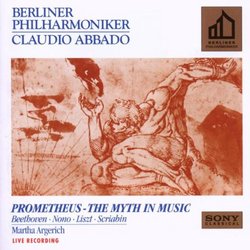| All Artists: Prometheus, Argerich, Abbado, Bpo Title: Myth in Music Members Wishing: 0 Total Copies: 0 Label: Sony Release Date: 10/4/1994 Genre: Classical Styles: Opera & Classical Vocal, Ballets & Dances, Ballets, Forms & Genres, Theatrical, Incidental & Program Music, Historical Periods, Classical (c.1770-1830), Modern, 20th, & 21st Century, Symphonies Number of Discs: 1 SwapaCD Credits: 1 UPC: 074645397825 |
Search - Prometheus, Argerich, Abbado :: Myth in Music
 | Prometheus, Argerich, Abbado Myth in Music Genre: Classical
|
Larger Image |
CD Details |
CD ReviewsA Prometheus in every age, on every block and instrument 04/09/1999 (3 out of 5 stars) "This is a misconceived CD with the obvious focus on Prometheus through the ages. This of course implies that Beethoven and Nono would share somehow similar views or inhabit some common conceptual space, when nothing could be further from the truth. But Abbado has been a devoted Nono colleage conducting much of his music during his lifetime, when Abbado was hardly known in the early Seventies. Here Abbado has assembled a formidable cast for the excerpts from "Prometeo", Suzanne Otto is a wonderful singer of new works. This was the first recording of Nono's" Prometeo" which still has documentary value in that the only other recording is by Matzmacher who although less informed than Abbado still brings a precision and clarity where it is needed. Scriabin I don't know, his concepts of spirituality finds a use someplace, but I prefer just listening. Argerich is always a compelling performer no matter what she touches." If you decide you must have it, get the DVD Christopher Culver | 10/26/2006 (2 out of 5 stars) "PROMETHEUS: Musical Variations on a Myth brings together four compositions inspired by the well-known story of the Greek figure who stole fire from the gods to give to Man, and was eternally punished. Claudio Abbado leads the Berliner Philharmoniker. It's available both on CD and, outside the U.S., on a DVD offered by ArtHaus music (it's region 0 so you can import it). I won't comment on the Beethoven or Liszt since I listen only to 20th-century and beyond repertoire. I shall limit my remarks to the Skriabin and Nono.
Skriabin's "Promethee, Poeme du Feu" (1910), the composer's fourth symphony, is fairly unremarkable as pure sound. Its bland tonality looks back to the 19th century more than to the future, and of course no purely instrumental work is capable of telling a story but instead evokes arbitrary interpretations, so the programmatic basis isn't recognizable. However, one major innovation is present: the colour keyboard. Scriabin assigned each note of the chromatic scale to a colour, and then had a keyboard made that would activate coloured lights during the performance. It's a pity this didn't catch on, of subsequent uses I know only Sofia Gubaidulina's "Alleluia" which has a colour organ. Scriabin's light show is highly intriguing, but of course you won't get it from the CD, which makes the DVD much more attractive if you are interested in this collection. The "Prometeo" work here by Luigi Nono is from a 1992 suite made from his opera of eight years before. It's a nine-minute setting of Hoelderin's "Schicksalslied", containing the telling line "we are destined to find no resting place". Such an approach is typical of the late Nono, a phase the opera inaugrated. Here he was mainly interested in vast expanses of pure timbre, and the female voices over low brass float along, occasionally joining in a Ligeti-like wall of sound, at other time striking in their detachment from one another. Contrary to the Scriabin, this piece is best heard from the CD, since the DVD contains some ridiculous camera effects that are meant to highlight the ethereal nature of the piece but instead just look stupid. In any event, we get here only a nine-minute extract, Nono fans should seek out the whole opera, released on EMI. Lovers of Beethoven and Liszt will have to look at other reviews to decide whether this collection is interesting for them. I'd say that the DVD is worth getting for Scriabin fans instead of the CD, but all in all nothing makes this collection especially attractive to fans of modern repertoire." |

 Track Listings (11) - Disc #1
Track Listings (11) - Disc #1